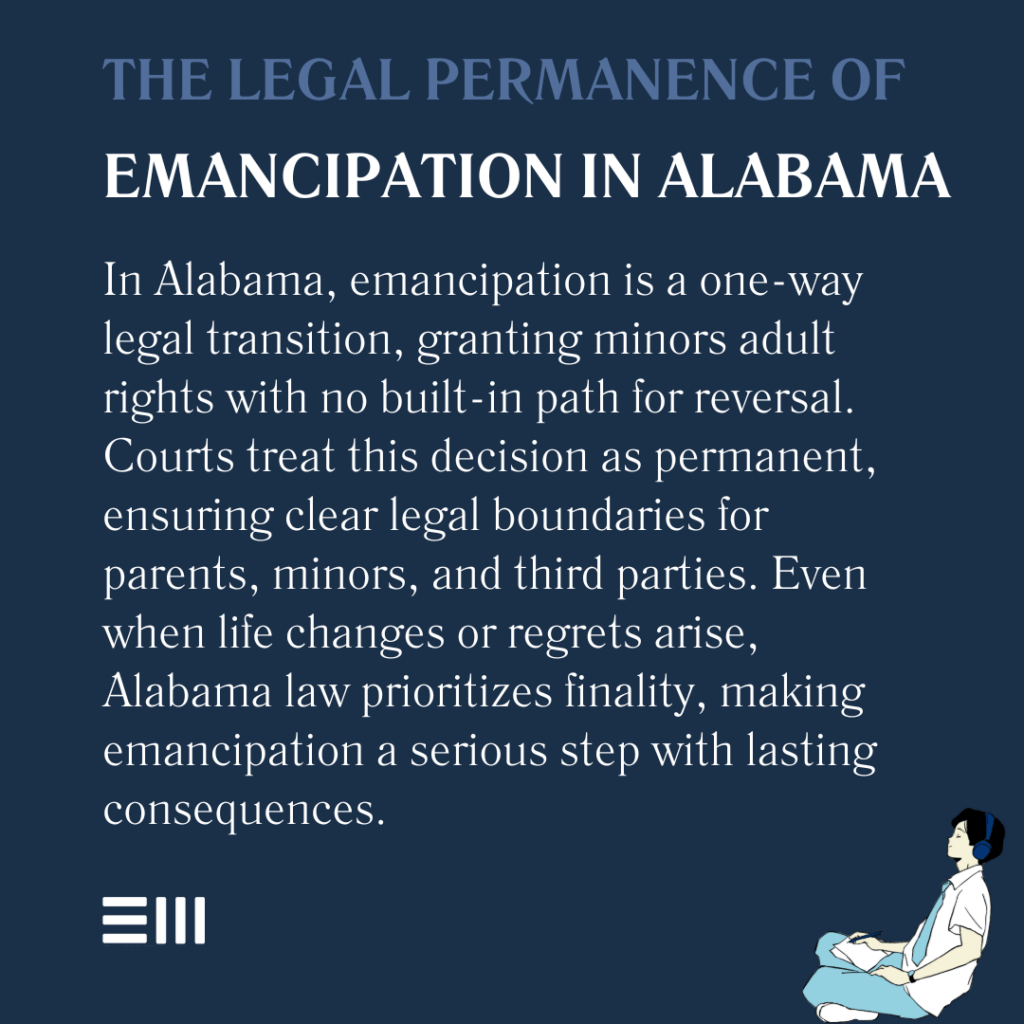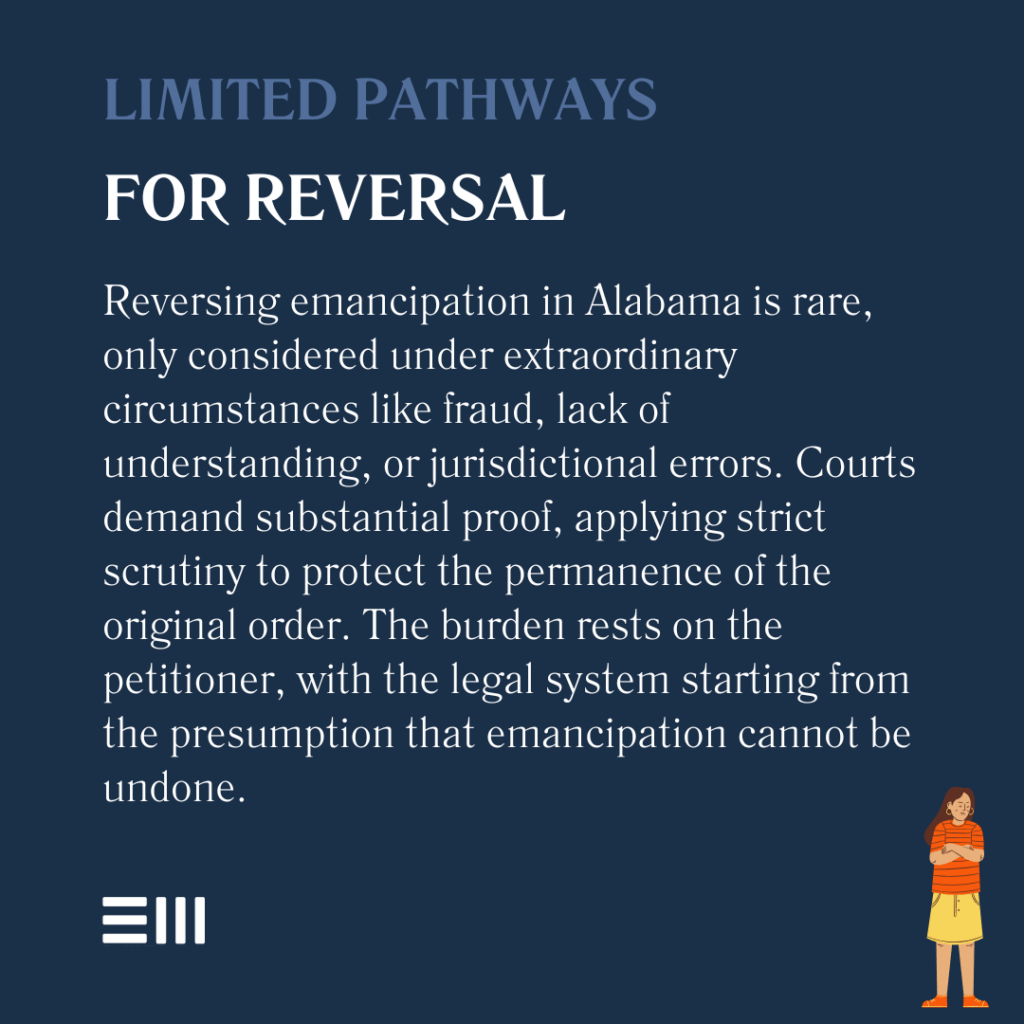
“I just want to draw attention to the fact that what we’re doing is pretty outlandish here,” declared Tennessee Senator Jeff Yarbro during a heated debate over parental rights legislation in 2024.
Though speaking about a different issue, his words resonate with many emancipated minors in Alabama who discover that legal independence brings unexpected challenges they’re ill-equipped to handle.
Some find themselves homeless, without healthcare, or struggling financially—desperately wishing they could reverse their emancipation decision. But in Alabama’s legal system, the path back from independence is neither straightforward nor guaranteed.
The harsh reality of emancipation’s permanence has sparked debate among Alabama family law attorneys and judges, who increasingly encounter former minors seeking to undo their legal independence.
Their stories reveal the complex intersection of parental rights, adolescent autonomy, and a legal system designed to create clean breaks rather than facilitate reconciliations.
The Legal Permanence of Emancipation in Alabama
Alabama law approaches emancipation as a permanent legal transition rather than a temporary status change. This permanence reflects the serious nature of granting adult legal rights to someone under the traditional age of majority.
The foundational principle governing emancipation permanence stems from Alabama Code Section 26-13-1, which frames emancipation as a one-way legal transition. Unlike some family court orders that include modification provisions, emancipation decrees typically contain no built-in mechanism for reversal or reconsideration.
Alabama courts have consistently held that the public policy interest in finality and clear legal status outweighs individual cases of regret or changed circumstances.
This presumption of permanence serves several important legal purposes, including providing certainty for third parties who interact with the emancipated minor, ensuring clear boundaries for parents whose rights have been terminated, and preventing manipulation of emancipation status for advantage in specific situations.
The Alabama judicial system treats emancipation seriously precisely because of its intended permanence and far-reaching consequences.

Limited Pathways for Potential Reversal
Despite the general presumption of permanence, Alabama law does provide extremely narrow potential pathways for emancipation reversal under specific circumstances. These exceptions represent extraordinary remedies rather than routine options.
The limited circumstances where reversal might be considered include:
- Proof that the original emancipation was obtained through fraud or misrepresentation;
- Evidence that the emancipated minor lacked capacity to understand the consequences;
- Demonstration that the court lacked proper jurisdiction for the original decree;
- Showing that the emancipation order violated fundamental constitutional rights; and
- Statutory changes that retroactively affect emancipation requirements or status.
These pathways typically require filing a petition for extraordinary relief rather than a standard motion to modify. Courts apply heightened scrutiny to such requests, requiring substantial evidence and compelling arguments for overturning the emancipation decree.
The burden of proof falls entirely on the party seeking reversal, with courts beginning from a strong presumption that the original order should stand.

Impact on Parental Rights and Obligations
The permanence of emancipation creates enduring consequences for parental rights and obligations that cannot be easily restored even when both parents and child desire reconciliation.
When emancipation occurs, these parental rights terminate permanently:
- Legal custody and decision-making authority;
- Right to determine residence and living arrangements;
- Authority over medical and educational choices;
- Ability to access records and information about the minor; and
- Control over the minor’s earnings and financial decisions.
Similarly, parental obligations that end with emancipation—including financial support, provision of necessities, and liability for the minor’s actions—remain terminated regardless of changed circumstances.
Even if a family reconciles emotionally and the young person returns home, parents have no legal obligation to provide support and cannot be compelled to resume financial responsibility through ordinary child support enforcement mechanisms.
The Voluntary Support Alternative
While formal legal reversal of emancipation remains nearly impossible in Alabama, families often create informal arrangements that functionally restore aspects of the parent-child relationship without changing legal status.
These voluntary arrangements typically include:
- Parents providing housing and financial support voluntarily;
- Families establishing consensus-based decision-making processes;
- Creating power of attorney documents for specific matters;
- Developing written agreements outlining mutual expectations; and
- Establishing clear communication boundaries and responsibilities.
These arrangements operate entirely outside the legal framework of parental rights and obligations. They derive their force from mutual agreement rather than court enforcement, meaning either party can terminate them at will.
For many families, these voluntary agreements provide a practical solution to emancipation regret without requiring formal legal reversal.
Special Considerations for Married Minors
Alabama law creates unique considerations for married minors seeking to reverse emancipation, particularly following divorce or annulment. These cases illustrate the complex intersection of marriage law and emancipation status.
In Alabama, marriage automatically emancipates a minor for most legal purposes. However, unlike court-ordered emancipation, marriage-based emancipation creates a special legal category with its own reversal possibilities.
Alabama courts have sometimes found that when a minor’s marriage ends through divorce or annulment, their emancipated status may partially revert if they return to parental care.
This limited exception derives from case law rather than statute, with courts reasoning that marriage-based emancipation fundamentally differs from court-ordered emancipation. The former occurs automatically through a status change that can itself be reversed (through divorce), while the latter represents an explicit judicial determination of adulthood readiness.
Consequences of Failed Reversal Attempts
Failed attempts to reverse emancipation in Alabama can create serious legal and practical consequences beyond mere disappointment. Understanding these potential outcomes is essential for anyone considering challenging an emancipation decree.
The potential negative consequences include:
- Court costs and legal fees with no practical benefit;
- Creation of unfavorable legal precedent for future cases;
- Potential liability for any parental actions taken without authority;
- Strain on voluntary reconciliation arrangements; and
- Emotional damage to newly-fragile family relationships.
Courts may also impose sanctions for frivolous filings if they determine a reversal petition lacks legal merit. These sanctions can include attorney fees, court costs, and other financial penalties. The risk of such outcomes discourages many families from pursuing formal reversal even when they strongly desire to restore the legal parent-child relationship.
The difficulty of reversal underscores the importance of careful consideration before seeking emancipation initially. Alabama courts intentionally set high standards for emancipation precisely because of its permanence, expecting petitioners to fully understand the irrevocable nature of their decision before proceeding.
Frequently Asked Questions About Emancipation Reversal in Alabama
Many misunderstandings exist regarding the potential for reversing emancipation in Alabama.
These frequently asked questions address common misconceptions and provide clarity on this complex legal issue.
What Constitutes Fraud in an Emancipation Proceeding?
Fraud in emancipation proceedings typically involves intentional misrepresentation of material facts that influenced the court’s decision to grant emancipation.
Examples include falsifying evidence of financial independence, misrepresenting living arrangements, or concealing information about parental objections. Proving fraud requires clear evidence that false information was deliberately presented and that it substantially impacted the court’s decision.
Can Parents Voluntarily Restore Their Rights After Emancipation?
No, parents cannot voluntarily reclaim parental rights terminated through emancipation, even with the emancipated minor’s consent.
Alabama law provides no mechanism for parents to formally restore their legal authority once emancipation occurs. While families can create voluntary support arrangements, these lack legal enforceability and do not restore the parent’s legal rights regarding the formerly minor child.
Does Returning to Live With Parents Affect Emancipation Status?
No, an emancipated minor who returns to live with parents remains legally emancipated in Alabama. Physical residence does not affect legal status once emancipation is granted.
Parents providing housing, financial support, or guidance to an emancipated child do so voluntarily rather than through legal obligation, and the young person remains legally independent regardless of living arrangements.
Securing Your Legal Position With Expert Guidance
The practical impossibility of reversing emancipation in Alabama highlights the critical importance of understanding all consequences before seeking independence.
Whether you’re contemplating emancipation, struggling with its aftermath, or seeking to support an emancipated minor in crisis, experienced legal guidance proves essential for navigating these complex waters.
Our Alabama family law attorneys bring decades of experience with Alabama’s emancipation laws and their real-world impact. We provide comprehensive counsel on all aspects of emancipation, from initial petition considerations to managing the permanent legal consequences that follow.
Our team offers practical strategies for addressing challenges without pursuing unlikely reversal attempts.
Contact Baxley Maniscalco today for a confidential consultation about your specific situation. Our compassionate approach and legal expertise ensure you’ll understand all available options and develop an effective path forward.
Can't find what you're looking for? Search our site below.










